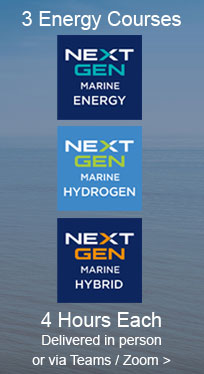Hybrid Fuel Cell Electric Propulsion for Marine Transport Applications: Case Study of a Domestic Ferry
With the increase in the volume of the world trade transported by the sea which has exceeded 80%, the interest in reducing the negative environmental impact of shipping has been growing recently. Therefore, the international maritime organization (IMO) has published and proposed regulations, measures and emission reduction policies to control the greenhouse gases emitted by ships. Hybrid electric power and propulsion concepts have been suggested by the IMO as an Energy Efficiency Design Index (EEDI) technical reduction measure to increase the energy efficiency of ships. Different power sources and technologies can be used in hybrid propulsion systems which include fuel cells. Using fuel cell as the main source of power can increase the potentials of hybrid electric propulsion systems for reducing the emissions problem.
In this presentation, an overview of hybrid electric power and propulsion concepts is introduced focusing on fuel cells, its basics, advantages, disadvantages, and its different marine applications. In order to assess the effectiveness of hybrid fuel cell propulsion systems, a three degree-of-freedom total ship system simulator is developed and implemented in Simulink/Simulink environment. For a domestic ferry of the Faroe Islands, a hybrid fuel cell electric propulsion system is proposed and studied using the developed ship simulator. A comparison between the proposed hybrid system and the conventional diesel engines is then presented in terms of the first cost, fuel cost, system size and weight. Simulation results of the developed simulator are validated for the ferry existing diesel propulsion system using real ship operational data.
Ameen Bassam - Fluid Structure Interactions Group, Southampton University

Ameen Bassam is a Ph.D. student in Fluid Structure Interactions research group within Engineering and the Environment at the University of Southampton.
Prior to beginning the Ph.D. program, Ameen worked as a lecturer assistant in the Naval Architecture and Marine Engineering department at the University of Port Said.
He completed his BSc studies in Naval Architecture and Marine Engineering, Suez Canal University, Egypt in 2007 and in 2011 he received an MSc degree in Ship Electric Propulsion Systems from Port Said University.
His current work focuses on the assessment of the effectiveness of fuel cells as an alternative technology for marine propulsion systems in order to reduce the negative environmental impact of shipping.









